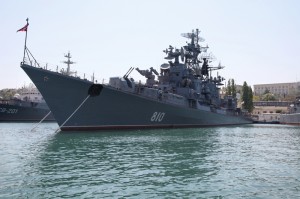Journal of Political Risk, Vol. 1, No. 1, May 2013.
By Anders Corr, Ph.D.
Russia has deployed at least a dozen warships near the coast of Syria in the past few months, the largest Russian naval deployment since the end of the Cold War. Yesterday, Russia delivered sophisticated radar-guided Yakhont anti-ship cruise missiles to Assad’s Syrian forces. The Russian actions are strategically offensive to the United States, as well its European and Israeli allies. They are meant to dissuade Israel, the US, and Europe from increased involvement. The anti-ship weapons, in particular, are offensive weapons that could be used by Assad’s Syrian forces to attack NATO naval platforms necessary for intervention in Syria (WSJ, NYT).
Russian actions with respect to Syria complicate the war from a primarily internal issue, to one over international influence between aspirant global and regional hegemons. Because the weapons delivery could be seen to counter Western military actions in the region, they have already increased US congressional criticism of Russia. Such criticism will likely increase in future, especially if the weapons are used against Western assets. This strategic offense to Western military commanders will lead them to more strongly support military options. Ironically, the Russian action increases pressure on Western political leaders to order intervention.
Western allies will be returning to the full panoply of military options in Syria. Not intervening could now appear as the US or NATO yielding to Russian military threats. Not intervening would increase the likelihood that other powers, such as China, Pakistan or Iran, would use similar strategies in the South China Sea or Afghanistan, to increase their influence and prestige with international and local audiences. Not acting will project military weakness and increase electoral costs to political parties currently in power in the US, France, the UK, and Israel.
The new Syrian missiles may increase the initial stand-off distance of Western naval assets, but they cannot stop an Intervention, including air strikes, an embargo, or a no-fly zone. A potential military reaction is what Israel executed in January — a limited airstrike on Syrian soil against a particular weapons shipment. Such a strike could be gauged to maintain a balance of power necessary for local belligerents to maintain the fight, avoid a costly fuller intervention, while redressing the most recent Russian strategic offense to western influence in the Middle East. If the strike is on Syrian soil, it will incur no risk of escalating tension with nuclear-armed Russia. However, such a strike presupposes knowledge of the location of the missiles.
The Russian delivery of anti-ship weapons to Syria is the latest in a series of politically dramatic Russian actions meant to increase the perception among both domestic and international audiences of a resurgent and powerful Russia. Expect more such Russian acts in the future, with an increasingly cool East-West relationship to follow.
Update: Israel hinted on May 28 that it would strike Russian weapons shipments arriving on Syrian soil (WSJ).
Note: This post was updated on 5/29/2013, 7/20/2013, and 8/12/2013.
JPR Blog

